Table of contents
- Letter from the Board
- Modelica Association
- Related projects
- Conferences and user meetings
- Vendor news
- Join TLK Energy’s Free Webinars on Modelica and CO₂ Capture
- Engineering Tools for the Modern Age: Introducing ODE from Orthogonal Supersystems
- SimulationX User Conference 2024 – On-Demand Access Now Available
- orchideo | easySSP v1.4.1 now available
- XRG Simulation - product and company news
- OpenModelica 1.25.0
- Just Released: OPC UA Version 3.0
- Modelon News
- Model Based Innovation LLC Updates and new Partners
- Education news
Letter from the Board
Dear Modelica, FMI, SSP, DCP, eFMI interested,
The new year starts with a new release of one of our standards: SSP2.0 has been released as Christmas present but if you have not taken notice yet, you may very well choose to enjoy it as an Easter egg:
ssp-standard.org/news/2024-12-20-ssp-2-0-release/
Whereas SSP (such as all our standards) has been carefully crafted to be generically applicable to a wide set of applications, one major driver for these efforts is the automotive industry. Hence, we welcome the increasing exchange and collaboration of the Modelica Association and ASAM whose primary aim is the standardization for automotive developments.
Regarding another important industry sector, we are also very glad to welcome Liebherr Aerospace Toulouse as new organizational member of the Modelica Association. Having one of the most important aerospace companies joining us is a significant gain for our community.
Standards such SSP are by their nature quite abstract in their description and hence the Modelica Association will increase its effort in providing suitable demonstration and educational material. One opportunity for a first introduction will be our next International Modelica & FMI Conference September 8-10 in Lucerne Switzerland: Here you can both join beginner tutorials as well as experts talks on the recent developments. Of course, we invite you all to also contribute to this conference:
- Scientific paper deadline is April 17
- Deadline for Industrial presentations and tutorials is June 1
- The exhibition space offers an attractive platform for our sponsors as well as the vendor session.
Furthermore we are proud to announce our keynote speakers:
- Mishra Siddhartha, Professor and Deputy Head of the Seminar for Applied Mathematics at ETH Zürich
- Johan R Åkesson, Associate Director for Computational Engineering at Carrier, Former CTO Modelon AB
While we mostly look forward to our upcoming events, I also want to personally reflect on the last events that I experienced myself.
I want to thank Daeoh Kang and Yongha Han from South Korea as well as their whole team for taking the initiative to organize the Asian Modelica Conference 2024. It was great to see so many applications of Modelica & FMI taking place in Asia generally and Korea specifically. To further strengthen our ties with Asia, I am currently planning a visit to China this May and meet Modelicans and new users from academia and industry.
Another joyful event was the annual OpenModelica Workshop in Linköping, Sweden. The progress in coverage and usability on the open-source tooling were remarkable and hence the discussions in the panel focused on future directions such as lowering the barrier of entry for new users and the integration of AI tools. These are not only topics relevant to OpenModelica but to the Modelica Association as a whole and hence will be part of our next Project Coordination meeting end of March.
Dirk Zimmer on March 11, 2025
Chair of the Modelica Association
This article is provided by Dirk Zimmer (Modelica Association)
Modelica Association
FMI news
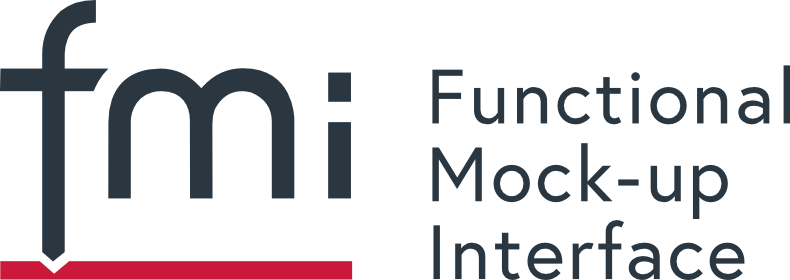
Maintenance releases FMI 3.0.2 and FMI 2.0.5 available
Two maintenance releases FMI 2.0.5 and FMI 3.0.2 have been released end of 2024 with clarifications and bugfixes and no new features compared to FMI 2.0.4 and FMI 3.0.1 respectively. FMUs created according to FMI 3.0.2 are valid FMUs according to FMI 3.0 and FMI 3.0.1 and vice versa. The good news is, that FMI 2 and 3 are actively maintained, and no serious bugs have been found in the FMI 3.0 specification yet, even though FMI 3.0 features are more and more used!
All releases are available on the FMI website. For a detailed list of changes see the releases page on GitHub.
Layered standards (pre-)releases by the FMI Project
The FMI Project is proud to announce the progress in the definition of layered standards on top of the FMI standard! (Layered standards are extentions to the core FMI standard for special applications.)
- FMI-LS-XCP v1.0.0 released: This layered standard defines support for XCP or “Universal Measurement and Calibration Protocol”, a network protocol defined by ASAM. This is the first layered standard on top of the FMI Standard released by the FMI Project!
- FMI-LS-BUS v1.0.0-rc.1 release candidate: This layered standard defines how to realize the simulation of network communication with FMI 3.0 means.
- FMI-LS-STRUCT v1.0.0-alpha.1 prerelease: Based on FMI 3.0, this layered standard defines how variables (especially parameters) of an FMU can be structured and grouped in a more flexible way than with the “structured naming convention” of the FMI Standard. The first version of this layered standard is focused on the definition of sampled maps.
Another layered standard, FMI-LS-REF is in an earlier development stage. It will allow for the inclusion of related files into an FMU. This includes parameter sets, reference stimuli and results, which can be used in additional experiments, as well as other relevant files to the FMU, like the model sources, requirements, or specifications.
Slides and recording of our presentation at the ASAM Conference 2024 available
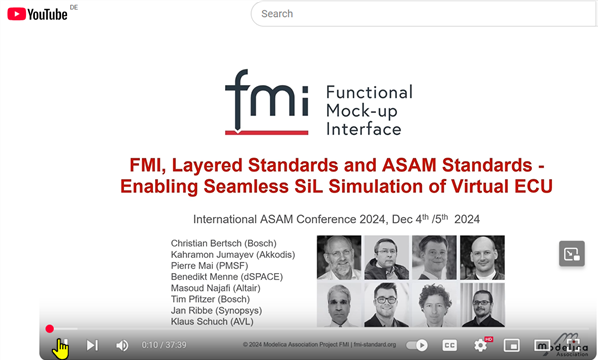
Representatives from the FMI Project presented “The Functional Mock-up Interface (FMI), Layered Standards and ASAM standards - Enabling Seamless SiL Simulation of V-ECUs” at the International ASAM Conference 2025 in Munich. The three new layered standards mentioned in the paragraph above were used for simulating virtual ECUs with FMI 3.0 means. A demo from tool vendors Akkodis, Altair, AVL, Bosch, dSPACE, PMSF and SYNOPSYS illustrates the interoperability of these layered standards.
The slides are available on the FMI website, and the video is available on Youtube.
16th Internation Modelica and FMI Conference Sept 8-10 2025 in Lucerne, Switzerland
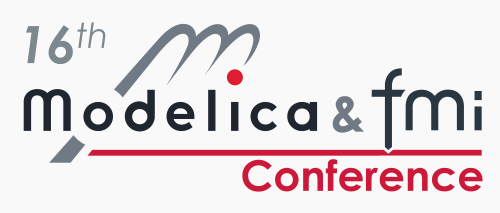
We are are happy to invite you to the coming 16th International Modelica & FMI Conference in Lucerne, where the importance of FMI is now also reflected in the conference title!
We will make sure, that this will be the most attractive conference also for participants mainly interested in FMI by creating a program where you can select sessions focused on FMI from the beginning to the end of the conference by providing
- tutorials on FMI
- keynotes with a general scope
- scientific sessions on FMI
- industrial user sessions on FMI
- Modelica-related sessions that also involve the usage of FMI
- sessions on FMI’s “sister” standards SSP, eFMI, DCP
Looking forward to meet you in Lucerne!
FMI Advisory Committee meetings
Besides the FMI Steering Committee members and Contributing members (see here), the FMI Advisory committee consist of the the following companies: AIRBUS, blue automation, Claytex, COMSOL, DNV, Fraunhofer (IIS/EAS First, SCAI), GM Motorsports, KEB Automation, LBL, NVIDIA, Knorr-Bremse Rail Vehicle Systems, MathWorks, Open Modelica Consortium, Samares Engineering, SINTEF Nordvest, University of Halle, Volkswagen, Volvo Autonomous Solutions, VTI.
After a very successful first advisory committee meeting on Nov 5th 2025, we have scheduled two more Advisory committee meetings:
- a Webmeeting on April 29th
- an in-person-meeting the day after the Modelica Conference in Lucerne. Meet the FMI community!
If you have a topic suggestion, want to join as a guest, or want to apply for membership in the FMI Advisory Committee, please contact contact@fmi-standard.org.
Other Resources and Discussion Forums for FMI-related Questions
- Visit the FMI tools page listing 230+ tools supporting FMI!
- Join the LinkedIn FMI community to get the latest news on FMI, FMI supporting tools and discussions within the user community.
- Ask technical questions and discuss topics on the usage of FMI on StackOverflow tagged “FMI”.
- Report problems of the standard itself or suggestions for new features in form of issues or discussions on fmi-standard.org
This article is provided by MAP FMI
Related projects
SSP 2.0: The Next Step in Standardized System Simulation

The Modelica Association has released SSP 2.0, marking a major milestone in the evolution of the System Structure & Parameterization (SSP) standard. Building on SSP 1.0, the new version expands capabilities for exchanging composite system models and simulation architectures, supporting FMI 3.0, Modelica components, and abstract simulation architectures.
Key advancements include:
- Architecture Exchange – Enhanced support for collaborative model refinement
- Advanced Co-Simulation – Improved robustness for complex system simulations incorporating FMI 3.0 features
- Broader Component Support – Integration of Modelica-based components
- Virtual ECUs – Seamless incorporation of FMI 3.0-based vECUs
- Layered Standards & Metadata – Strengthened interoperability and traceability
- Next-Gen Digital Twins – Enabling multi-layered system modeling
- AI & Machine Learning – Optimized parameter calibration for smart applications
With SSP 2.0, industries such as automotive, aerospace, energy, and manufacturing can push the boundaries of digital engineering, virtual prototyping, and AI-driven development.
Learn more in the SSP 2.0 press release.
This article is provided by Pierre Mai, Hans-Martin Heinkel, Peter Lobner
The SSP Traceability Layered Standard
The demonstrated credibility of simulations to decision makers is one of the key challenges to make system simulation more widely accepted. This has been clearly shown e.g. by the ASSESS initiative of NAFEMS, see ASSESS Credibility.
This critical topic is addressed in the SSP Traceability layered standard by the Modelica Association with a new standard to be released within the first half of this year. The SSP Traceability standard provides standardized Documentation and Meta Data along the entire Process. It does so by building a Chain of Trust for Confident Simulation-Based Decision Making. This is achieved by establishing a digital thread of simulation-based evidence linking simulation processes to product requirements and KPIs, which makes simulation results for product decisions verifiable.
SSP Traceability enables open, Flexible & Scalable Credible Simulations by documenting the relevant simulation process aspects in a traceable, consistent and standardized format that companies can tailor and scale to their credibility needs
The standard provides Flexible and Standardized Metadata Exchange through the built-in Simulation Resource Meta Data (SRMD) format. That format ensures a well-structured, flexible and efficient way to collect and share simulation metadata across the development lifecycle.
In addition, the new standard facilitates Model Reuse and Continuous Improvement, because the well-documented SSP Traceability simulation resources facilitate the reliable reuse of existing simulations and models and the continuous improvement of simulation best practices, processes and resulting artefacts.
SSP Traceability thus builds a bridge between process-oriented Systems Engineering (SE) and accuracy-oriented System Modeling and Simulation. The Modelica Association will work with other organizations, such as the Object Management Group OMG to improve the interoperability between Modelica Standards, and SE-standards in the next steps to improve tool interoperability even further. The current specification is available online. Comments by interested parties can be supplied in the issue section of the github repository. The Release of version 1.0 of SSP Traceability is planned for Q2 2025.

This article is provided by Hubertus Tummescheit, Model Based Innovation
Conferences and user meetings
OpenModelica Workshop 2025
The 17th OpenModelica Annual Workshop organized by the Open Source Modelica Consortium was held successfully in Linköping, Sweden, on February 3, 2023.
Workshop chairs were Lena Buffoni and Lennart Ochel.
New results and applications regarding the OpenModelica platform were presented, including Status and directions of OpenModelica, a keynote about Modelica Lite - Towards a Strict, Robust and Scalable Subset of Modelica, Highlights of the latest OMSimulator, Status and Development of the new Backend, An Open-Source Exercise Package for Electric Power System Teaching using the Dynawo Modelica Library, Experience with Google Colab for running Modelica FMU in notebooks and no installation, Newton Diagnostics: a new handy tool for failing initialization debugging, An Open-Source Implementation of WECC Battery Energy Storage Systems Models for Power System Stability Studies, Current Status and Technical Overview of OpenModelica and its Development Environment, Extending Direct Collocation-Based Dynamic Optimization with Adaptive Mesh Refinement, NeuralNetwork 3.0: A Library for representing PeNODEs in Modelica, Automatic Layout Generation and Translation of System Dynamic Models, Dynamics of mechanical press, Optimization of Ethanolamines Production with OpenModelica & CasADi, AESE Library Developed in OpenModelica: Simulation and Research for Nuclear Power Systems, Panel on Future Directions of OpenModelica.
The program and the presentations are available here
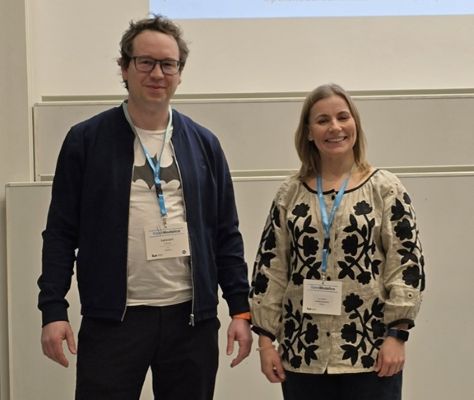
Lennart Ochel and Lena Buffoni, Chairpersons, opened the workshop and were leading the panel discussion.
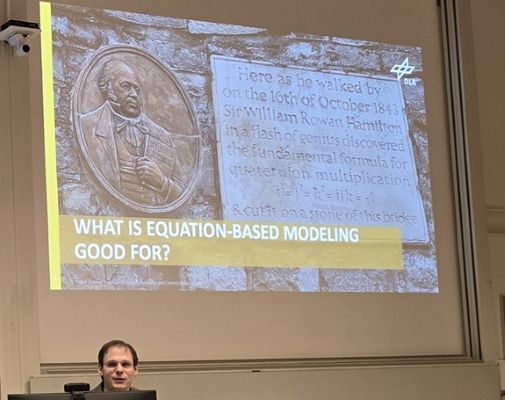
Dirk Zimmer, Chairman of Modelica Association, gave an interesting keynote “Modelica Lite - Towards a Strict, Robust and Scalable Subset of Modelica”
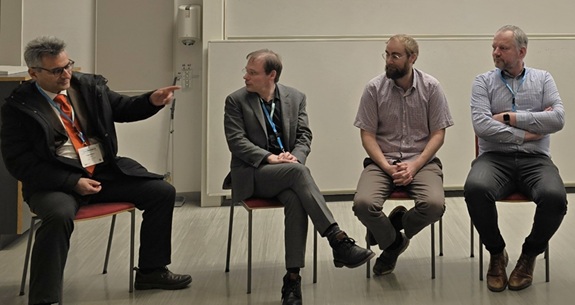
Panel discussion on the future of OpenModelica. From left: Francesco Casella, Dirk Zimmer, Robert Hällqvist, Lars Eriksson
This article is provided by Peter Fritzson Open Source Modelica Consortium
MODPROD Workshop 2025
The 19th international MODPROD Workshop on Model-Based Cyber-Physical Product Development, organized by the MODPROD competence center at Linköping University, was successfully held at Linköping University, Linköping, Sweden, February 4-5, 2025.
Four very interesting keynotes were presented:
-
Per-Olof Marklund, Head of Technology and Innovation, Saab Aeronautics “Digital Engineering at Saab – history and future”
-
Prof. Manuel Wimmer, Johannes Kepler University Linz “Model-Driven Engineering of Digital Twins”
-
Prof. John Baras, University of Maryland College Park, USA “Efficient Incorporation of ML and AI in Model-Based Systems Engineering for Cyber-Physical Product Development”
-
Dr. Mattias Tiger, Deputy leader of Reasoning and Learning Lab, Linköping University “Overview of AI Modeling Challenges in Preparing Robots for the Real World”
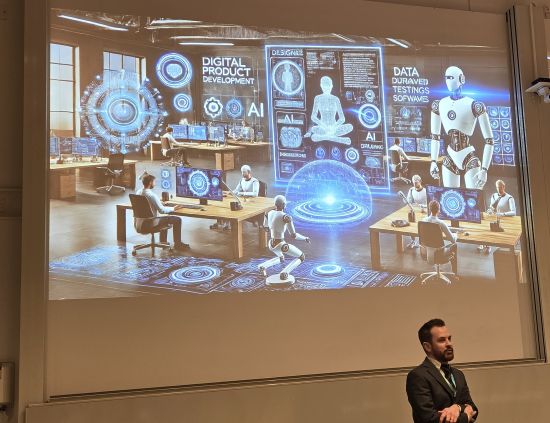
Dr Robert Braun, Chairperson, opens the workshop. The background is a Chat GPT AI generated picture related to the topics of the workshop.
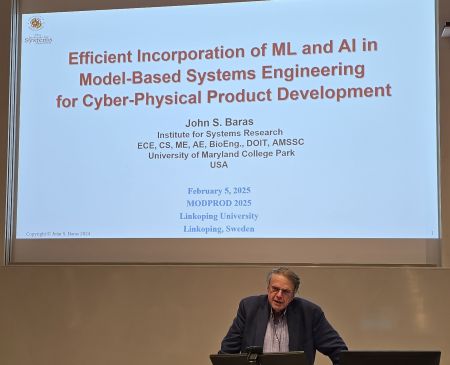
Prof. John Baras, presents his keynote on Machine Learning and AI in Model-based sysems engineering.
In the evening the first day we had a real highlight, a study visit to CMIV – The Center for Medical Image Science and Visualization at Linköping University. An extremeley interesting presentation was made by Anders Persson, professor and director of the center. Amazing visualizations and simulations were presented.
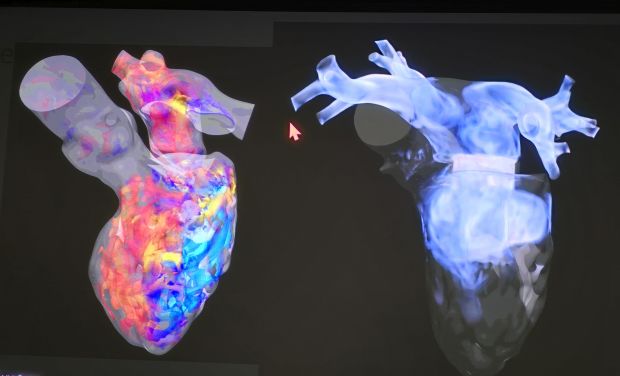
A visualization of dynamic flows in a human heart, presented at the CMIV center.
The program and (soon) the presentations are available from www.modprod.liu.se
This article is provided by Peter Fritzson Open Source Modelica Consortium
Vendor news
Join TLK Energy’s Free Webinars on Modelica and CO₂ Capture
TLK Energy recently marked its 10th anniversary. Over the past decade, the company has been shaped by a strong commitment to system modeling with Modelica, guided by the open-source mindset and collaborative approach of the Modelica community. These values continue to drive TLK Energy’s work and knowledge-sharing efforts.
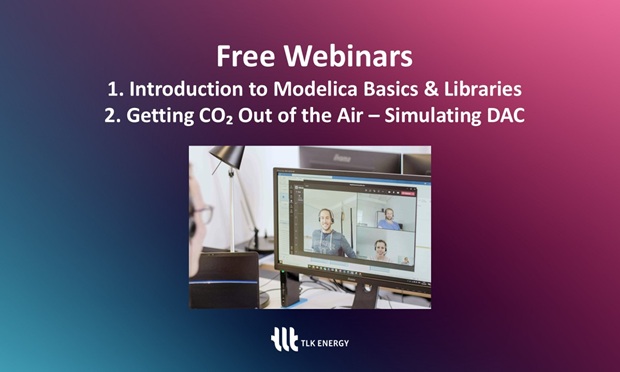
As part of this, TLK Energy is hosting two free webinars on system modeling and simulation:
Upcoming Webinars
Introduction to Modelica Basics and Our Model Libraries This session is designed for those new to Modelica or interested in exploring TLK’s model libraries. It will also feature demonstrations of TIL running in different simulation environments, including Dymola and Modelon Impact.
Date: May 13 Time: 3:00 PM
Capture More CO₂ from the Air – Simulation-Based Design of Direct Air Capture Processes (in collaboration with 3P Instruments) This webinar will focus on adsorption processes in direct air capture applications and how TIL Adsorption can contribute to optimizing these processes. It will also cover the role of measurement data in improving simulations.
Date: May 15 Time: 3:00 PM
Both webinars offer an opportunity to exchange knowledge and discuss system modeling approaches with others in the field.
This article is provided by Lina Rosenthal (TLK Energy GmbH)
Engineering Tools for the Modern Age: Introducing ODE from Orthogonal Supersystems
Web-native Simulation Environment Orthogonal Supersystems, a Munich-based high-tech startup, unveils ODE, a web-native Advanced Modelica Simulation Platform. This state-of-the-art environment fully supports MSL 4.0 and integrates widely adopted Modelica libraries, such as DLR’s Thermofluid Stream, Chemical, Buildings, and so on. Delivering desktop-grade performance, it pairs powerful simulation capabilities with the flexibility of cloud access and effortless mobile compatibility.
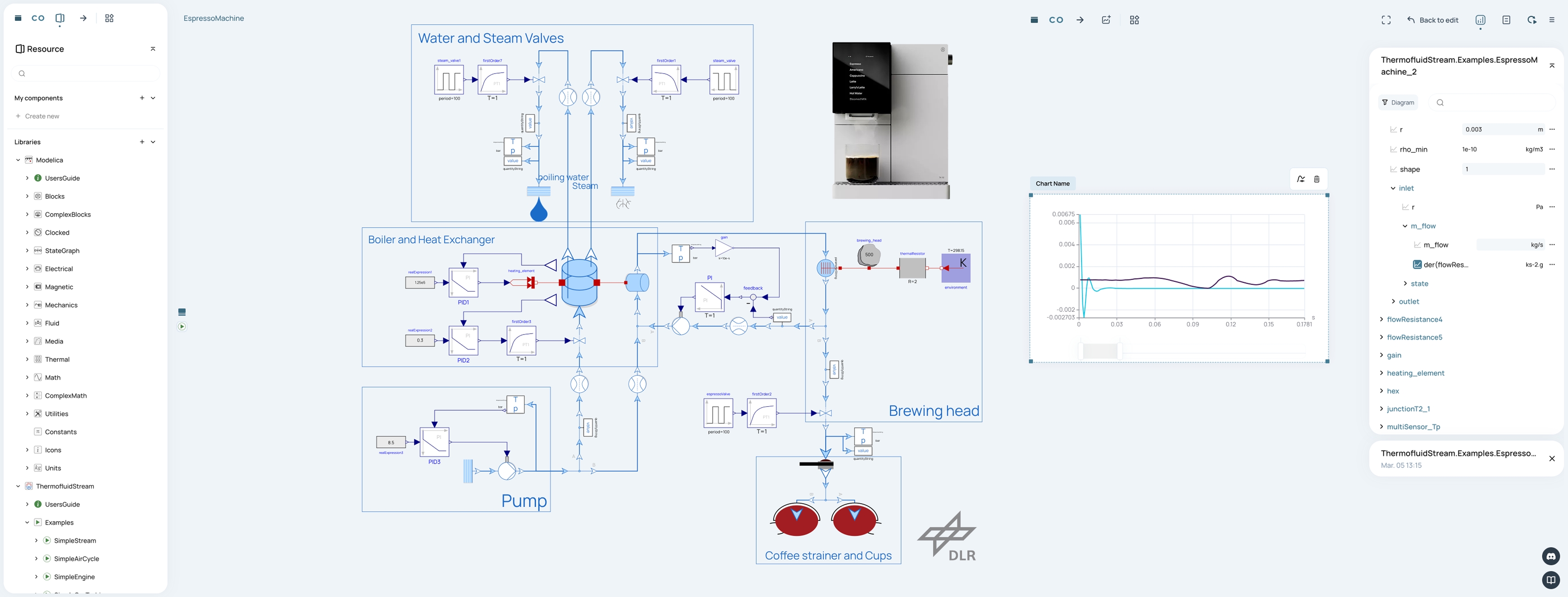
Advanced Model-Based Application Tools ODE features robust model-based application tools, including System Assembler for constructing SSP systems with FMU integration, sophisticated 3D visualization that connects directly to Onshape CAD systems, and interactive components enabling real-time simulation.
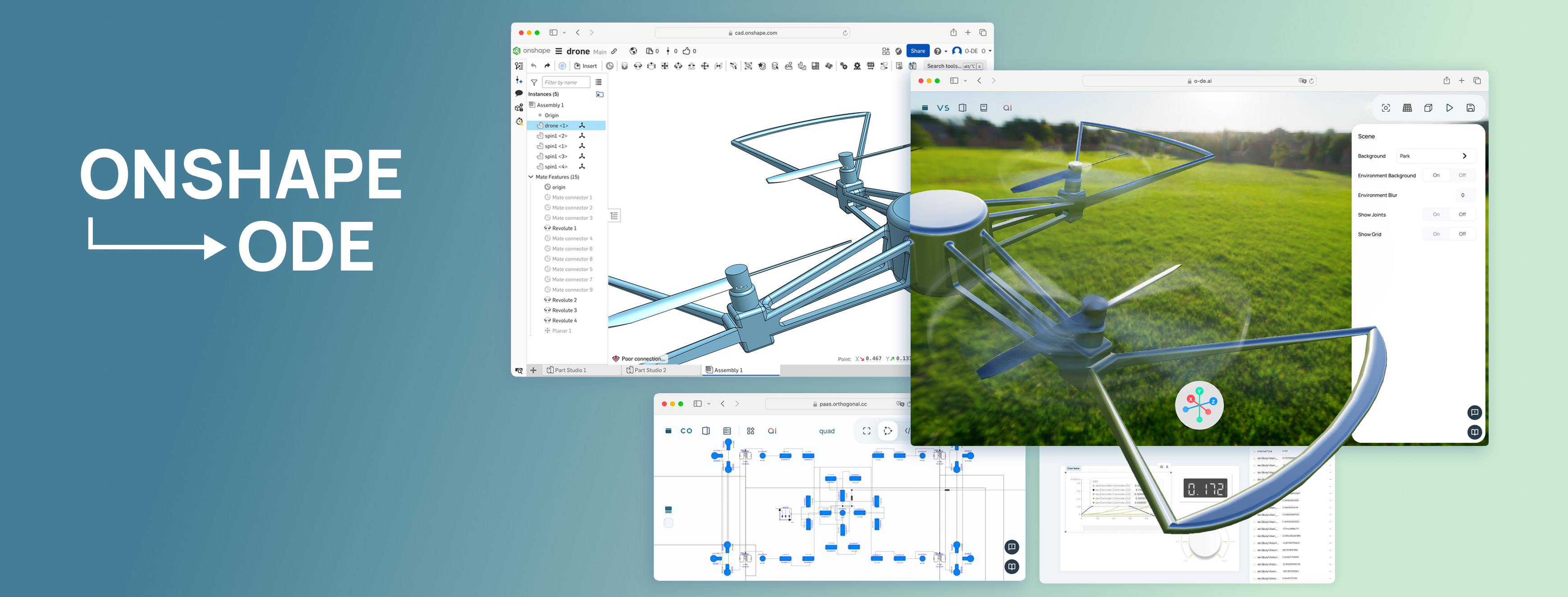
Enhanced User Experience A suite of intuitive widgets streamlines modeling and simulation tasks, featuring a sleek cover editor, a versatile documentation editor, and a robust mathematical calculator with command-line capabilities for advanced matrix operations and scientific visualization.
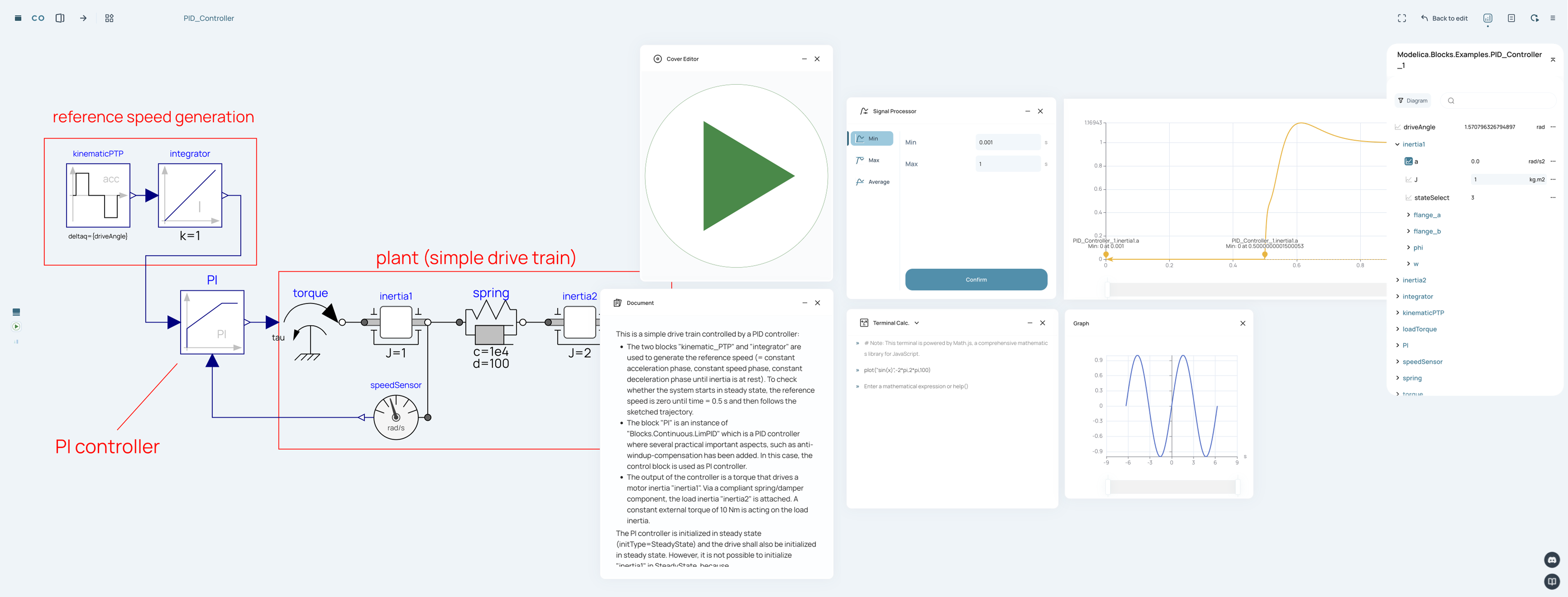
Design-Driven Philosophy The platform’s reimagined minimalist user interface reflects Orthogonal’s design-driven approach, eliminating unnecessary complexity while ensuring intuitive usability. Built on a future-ready software architecture, ODE’s roadmap includes upcoming features such as team collaboration capabilities, AI integration, and expanded third-party tools connectivity.
This article is provided by Yang Ji (orthogonal supersystems)
SimulationX User Conference 2024 – On-Demand Access Now Available
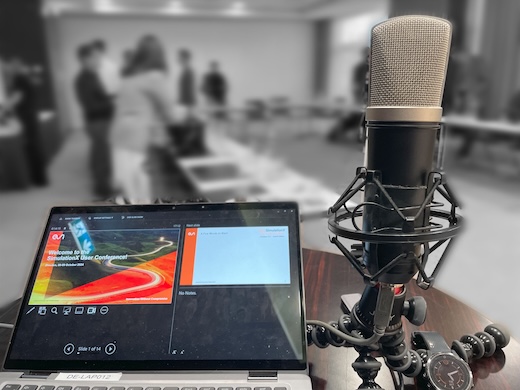
The SimulationX User Conference 2024 brought together experts from automotive, aerospace, energy, and industrial sectors to explore the latest advancements in system simulation. Keynote sessions included insights from Prof. Dr.-Ing. Guenther Prokop (TU Dresden) on cyberphysical prototyping and Tata Motors on sustainable transmission validation. Presentations from IAV GmbH, JAXA, Daimler Truck AG, and INNOMOTICS covered topics such as NVH analysis in EVs, digital twin applications, and multibody system modeling for trucks.
Don’t miss this opportunity to gain valuable insights—watch the sessions on-demand here.
Additionally, a special Tutorial Day on scripting in SimulationX with Python, efficiency tips, and inverse kinematics is available on request.
This article is provided by Majid Aziz (ESI KeySight)
orchideo | easySSP v1.4.1 now available
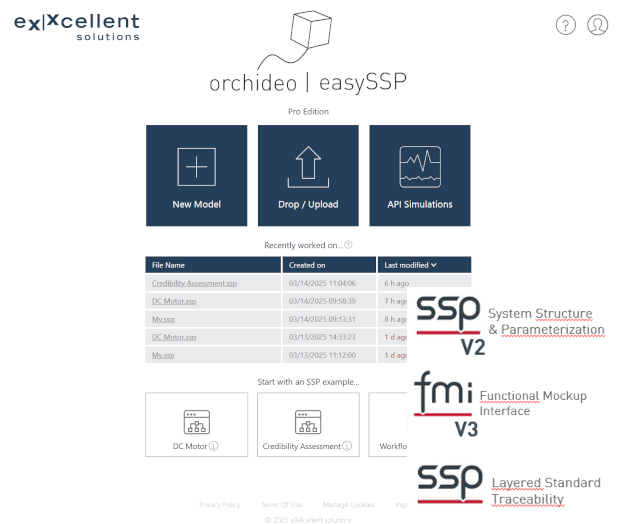
The new easySSP version 1.4.1 introduces support for the newly released SSP 2.0 standard for import & export, modeling and simulation, enabling improved exchange of system simulation models and architectures. This includes updates such as FMI 3.0-compatible data types, support for acausal modeling, and embedded Simulation Resource Metadata (SRMD).
Moreover easySSP’s FMI support has been extended to version 3.0, allowing users to:
- Export FMI component hulls
- Integrate FMI components into system architectures
- Display FMI properties
- Synchronize FMI components with the SSP model
- Simulate SSP models with FMI components in easySSP
The workflow mechanism, which integrates with SSP and SSP Traceability, now offers a new option to export the workflow documentation as PDF.
Additionally, working with Modelica types in SSP models has been simplified - users can now directly select Modelica-specific connectors and parameters in the model editor.
easySSP is completely based on open standards like SSP, FMI and SSP Traceability. Check out easy-ssp.com for more information!
This article is provided by Gregor Hermann, Peter Lobner eXXcellent solutions
XRG Simulation - product and company news
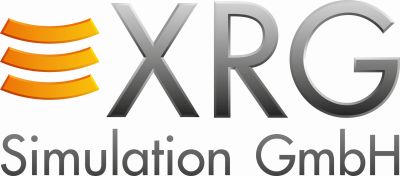
XRG celebrates its 20th anniversary this year. The company was founded to deliver premium thermal system simulations to industrial customers with - at that time being - the relatively new Modelica modelling language. Today, we see a broad acceptance of this technology and a simple equation holds: Energy simulation = Modelica simulation. If you like to learn about our milestones from 2005 until the present day, please refer to:
XRG-Milestones from Today to Foundation
Modelica Library Announcements
HumanComfort Library 2.19.0 offers a more detailed calculation of surface temperatures due to direct solar irradiation. The new approach, which is only available for the coarse grid CFD models, determines which individual surfaces are actually exposed to short-wave irradiation entering through windows of the air-conditioned space. For this the current time-dependent sun position (zenith and azimuth) is taken into account. This general feature is also applied to use cases like automotive cabins when the grid model is used. While changes in average air temperatures will be low, local changes can be stronger.
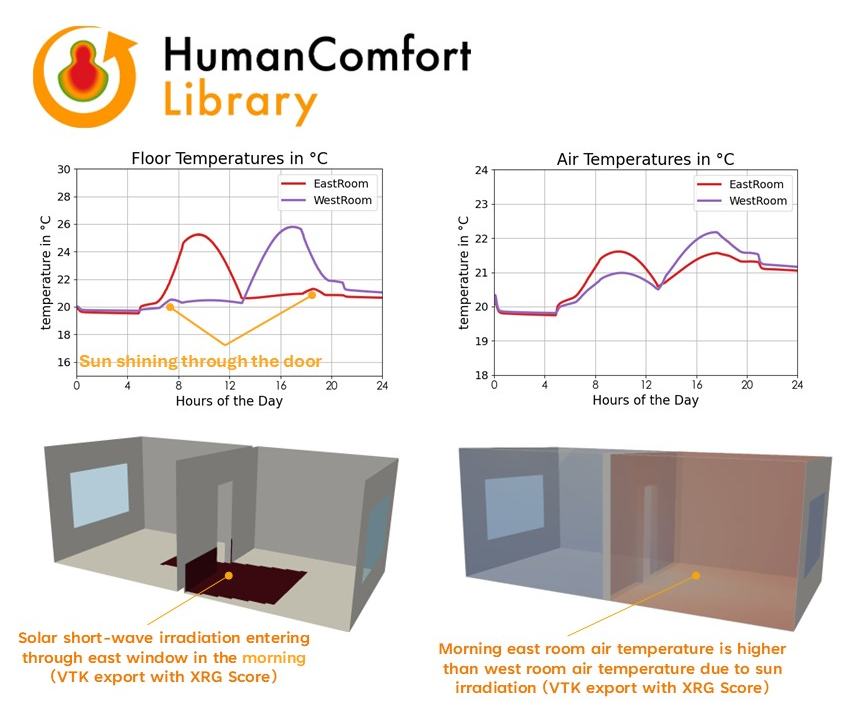
Moreover, the new incidence angle model in opaque surfaces computes angle dependent transmission coefficients for the material, which might improve accuracy of irradiation and surface temperatures.
HVAC Library 3.4.0 for HVAC system simulation comes with significant new features:
- Optionally, liquid systems can now be simulated with detailed hydraulic parameters. This paves the way to hydraulic balancing simulations. During the dynamic simulation the pump’s pressure curve matches the system curve at any time and imbalances in mass flow (and energy) distribution can be investigated throughout the network. The classic performance-oriented approach is still available and switching between both modes with minimal interaction becomes possible. First industrial use cases gave positive feedback on this new feature.
- Overall weather data files can be imported with one click. This convenient mode starts with the popular Energy+ weather file format (.epw) which is automatically converted to hourly input files. Learn more …
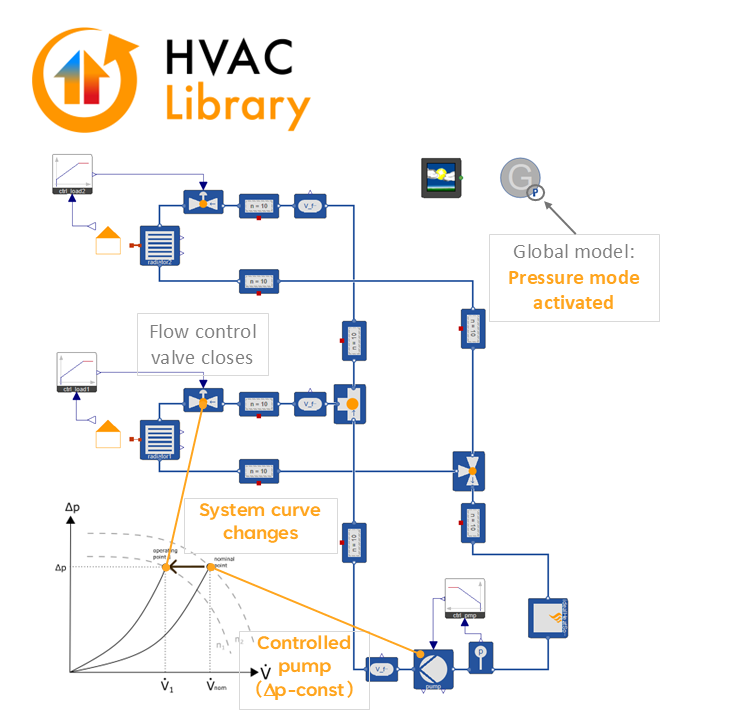
ClaRa+ Library 1.7.6 for energy system simulation provides these new features:
- A fast and efficient model for water-hammer effects in fluid flow has been included. The 1D finite volume model for fluid flow in pipes is suitable to simulate water-hammer effects accounting for possible formation of vapour cavities. Numerical oscillations due to finite volume discretization are damped by eigenvalue shifting and the speed of sound in the fluid is corrected for the wall properties. This feature was successfully validated with experimental data.
- A compressed gas storage tank suitable for surface or salt cavern storage. The model can be used to model pressurized storage tanks for gaseous media regarding transient heat conduction to the surrounding material.
OpenScaling
This month, XRG has gratefully received the approval to participate in ITEA4 OpenScaling project from Apr. 2025 to Dec. 2026. The project aims to further enhance “open standards and established modelling and simulation tools to better support large-scale systems and distributed controllers optimized to minimize energy consumption and greenhouse gas emissions”.
Our contribution is to further develop coarse grid CFD modelling in our HumanComfort Library and our artificial intelligence interface to Modelica SMArtInt and SMArtInt+.
References
- Open source SMArtInt version on Github
This article is provided by Stefan Wischhusen XRG Simulation GmbH
OpenModelica 1.25.0
OpenModelica 1.25.0 will be released late March 2025. It will be regular early-spring release of OpenModelica.
Main highlights: OMEdit now supports hierarchical parameter editing in structured models, a Reload package feature, and an Open Class in text view feature.
OpenModelica Compiler (OMC)
The new front end has been further improved with 15+ issues solved. Two fixes regarding the new experimental Base Modelica flat output.
Regarding backend work, 5 issues were fixed in the currently used
backend. Additionally, 15 issues were address in the new backend,
which is still under development and experimentally available with the --newBackend compiler flag.
Regarding the C runtime, several issues were addressed.
A new experimental feature, the Newton Diagnostics, was added to the C runtime. This feature can be activated by the simulation flag
-lv=LOG_NEWTON_DIAGNOSTICS; this computes and displays a ranking of the most likely start attributes responsible for the
failure of Newton-Raphson iterations on nonlinear implicit systems during initialization. As such, it can be an invaluable tool for troubleshooting initialization failures due to convergence issues caused by badly
chosen start attributes. For more details see the paper by F. Casella and B. Bachmann on this topic (here is an open-access preprint on ArXiv)
and the presentation at the 2025 OpenModelica Workshop for more details. Please note that residual scaling
is still not implemented, so this feature is not yet fully operational when applied to systems of equations that are badly scaled due to the use of SI units.
Graphical Editor OMEdit
OMEdit 1.25.0 provides several, long awaited-for features.
The first is hierarchical editing of model parameters #2891: you can now change parameters not only for top-level components, but also for its sub-components. This feature is available by right-clicking over component icons and selecting Show Element; this can be done recursively to set parameters of sub-sub-components, etc.. Replaceable components and classes can be handled in the same way. Previously, this was only possible by switching to the textual input mode and by manually adding the corresponding nested modifiers and redeclare clauses to the top-level component instances.
The Reload feature was implemented #5664: if you right-click on a top-level package, the whole package is unloaded from memory and reloaded from the file system, while preserving the status of the already opened sub-packages in the Library browser. Previously, you had to first select Unload, then re-open the package, and then navigate again through the sub-package hierarchy to reach the model(s) of your interest. This feature is very convenient when working with multiple Modelica tools in parallel, or when editing some parts of a library with textual editors, because it allows to update the loaded package to the updated version on the file system with a single mouse click.
When browsing the code of a class in the textual view, it is now possible to open any class mentioned in the source code by just right-clicking on it and selecting Open Class, or just by the ctrl-click shortcut #8854.
It is now possible to select a part of a model diagram by dragging a selection window, then copy and paste all the selected components either in the same model, or into a new model #12687.
OMEdit now automatically adds the each prefix when providing scalar parameter values to parameter arrays,
avoiding the common error of forgetting to add it manually #13636.
The new instance-based infrastructure of OMEdit is now fully mature and far superior to the old graphical editing mode from all points of view. Hence, starting from version 1.25.0, support of the old graphical editing mode is dropped #13257.
Many OMEdit bugs were also fixed in this release. Overall, 40+ issues were addressed.
FMI export
Several issues regarding FMI export were addressed.
A serious bug #13582 affecting co-simulation FMUs using the CVODE stiff solver was identified. It has been not yet fixed, but it should be fixed in the final 1.25.0 release, or in a patch 1.25.1 release.
OMSimulator
OMSimulator focused on improving Model Exchange simulations. We analyzed multiple Modelica libraries, including MSL4, and addressed key issues in event handling and ODE solver implementation.
These enhancements increased coverage from ~50% to ~95% across several libraries.
The results were presented at the OpenModelica workshop in February 2025.
The latest stable release, OMSimulator 2.1.3, is available on GitHub or via pip pip install OMSimulator
Next release
The next release is planned to be released in autumn 2025. It should include further improvements to the GUI such as a restructured Simulation Setup dialog, faster editing of large models in OMEdit, etc. Further improvements in FMI 2.0.x export are also planned.
This article is provided by Adeel Asghar, Francesco Casella Open Source Modelica Consortium
Just Released: OPC UA Version 3.0
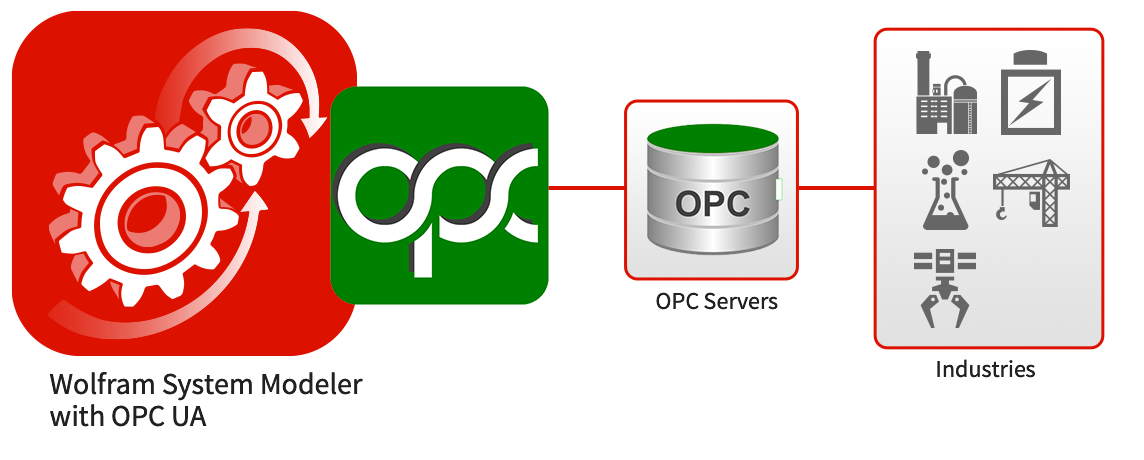
Safely connect to real-world data using the free OPC UA library 3.0!
- The latest version of the OPC UA library enables the creation of scalable and secure industrial applications, including hardware-in-the-loop simulations, digital twin integration and advanced control system development.
- It incorporates robust authentication, encryption and performance enhancements to support industrial automation needs.
Know more or try the free OPC UA library here: https://www.wolfram.com/system-modeler/libraries/opc-ua/
This article is provided by Ankit Naik Wolfram
Modelon News

Modelon Celebrates Twenty Years of Excellence in System Simulation
Two decades ago, Modelon was founded with a bold vision: to revolutionize system simulation by embracing an open standard for modeling and simulation—Modelica! Co-Founder Johan Andreasson wrote a reflection about our journey.
New in Modelon Impact: Analysis View
We now have a dedicated space for data visualization in Modelon Impact. While users can still configure graphs in the model view, they can now configure multiple plots and graphs simultaneously for comparative analysis.
- In-Depth Comparisons: Compare different versions of the same model within a single graph.
- Flexible Graph Types: Choose between line, scatter, or histogram to visualize your data exactly how you want.
- Synced Scales & Zooms: Align your time scales and zoom levels across variable graphs for more seamless analysis.
New Case Study: Babcock Power: Enhancing Design and System Performance for Direct Combustion Boilers
Babcock Power chooses Modelon Impact to predict and improve utility-scale boiler performance in a changing energy landscape, incorporating new fuels and renewable energy sources. Read the case study.
New Blog: Designing Closed-Loop Control Systems with Modelica
A well-designed closed-loop control system is the key to keeping systems stable, efficient, and responsive. Without it, performance suffers—often leading to instability and reduced lifespan.
Learn how engineers can develop high-fidelity control strategies that are tested and optimized inside Modelon Impact before real-world deployment.
Sign up for the Modelon newsletter.
This article is provided by Matt Bourland (Modelon)
Model Based Innovation LLC Updates and new Partners
Model Based Innocation (MBI LLC for short) has had a busy few months since the last newsletter. We have now official partnerships with many well-known players in the Modelica and FMI community to promote and distribute their tools in the Americas. With these partners, we can be the one-stop shop for solutions based on the Modelica Association standards.
Tool partners
- As a reseller of Modelon, we offer Modelon Impact, the Modelon Libraries, and the FMI-Toolbox
- As a reseller for PMSFIT, we offer the PMSFIT FMIBench solution, supporting both FMI and SSP.
- As a Partner of eXXcellent solutions GmbH, we offer orchideo | easySSP
In the combination of these tools, this covers needs for standards-based system simulation for everything from small customers to enterprise needs.
Library Partners
- We are a reseller for TLK-Energy and their Process Systems Library. This library is specialized on Power-to-X processes.
- We are a reseller for TLK_THERMO GmbH and their flagship Library TIL-Suite for modeling of thermal systems.
- We are a reseller for XRG Simulation GmbH and their broad portfolio of libraries for Building Simulation Human Comfort Library and HVAC Library, and Machine Learning and Neural Networks SmartInt+
For Libraries, our main Modelica platform is Modelon Impact, but we work with other tools as well, especially for open-source libraries, and extending open-source libraries. Our Library partners offer in addition some add-on productivity-tools that are tailored for their specific simulation domain. They are also available from MBI-LLC.
Dedicated Services
Most new users of simulation solutions will need some getting-started services. MBI LLC offers the complete spectrum of services for that, with training, customization of tools and libraries, and
- Training for new and advanced users, for tools, and libraries. Here our focus is on controls-oriented modeling and design workflows, and modeling at the right level of complexity for the use case.
- Customization of products for specific workflows and integration with in-house data and custom tools
- Customization and add-ons for commercial modeling libraries. For this, we work with our partners, to that we work with tailored know-how and specialists for all products in our portfolio.
- Development of custom model libraries and solutions
- Getting-started services for Model-Based Design, developing the right processes for your company size and mission, including the integration with systems engineering
With the above portfolio, MBI LLC should be able to put together the right solution for you, no matter where you are on your journey to standards-based system simulation! We are going to add further partners in the coming months. Please note that since some of these partnerships are new, they ar not yet announced on our website. Please contact us with your requests!
This article is provided by Hubertus Tummescheit, Model Based Innovation
Education news
Containerizing SSP
SSP means System Structure and Parameterization, a relatively new standard for storing simulation models, parameter sets, and documentation. Containerizing an SSP file is the new thing around town. By that I mean converting a system described with SSP to a free-standing Functional Mockup Unit (FMU), which is a great benefit for tools that do not support SSP (yet).
Dymola supports import of SSP and export of FMUs (big news, huh?). Would it be possible to extend Dymola with SSP containerization?
Simple containerization
Actually, that is pretty trivial to do using existing functionality, because importSSP returns the name of the Modelica model generated for the “root” system defined by the SSP.
So we can use that to export an FMU.
m = importSSP("DC-Motor2023.ssp", silentSave=true);
translateModelFMU(m, false, "DC_Motor", "2", "cs", false, 1);
Containerizing a parameterized model
The next natural step is to apply an additional parameter set to our model, and then export it as an FMU with modified parameters encapsulated in the FMU.
Here we make an experiment by increasing the inductance of the electrical machine, where the data is stored in a CSV file.
The command importSSV takes a parameter file in SSV or CSV format, and a model to apply those parameters to.
m_alt2 = importSSV("DC_Motor_Alt2.csv", m);
translateModelFMU(m_alt2, false, "DC_Motor_Alt", "2", "cs", false, 1);
In Modelica we use the common idiom of extending from the base model while appying modifed parameters in the extends-clause.
Running a comparison
To run the simulation we can import the two FMUs, drop them into a model (called Unnamed, this step is not shown) and simulate.
importFMU("DC_Motor.fmu", true, false, false, "", fill("",0), "DC_Motor_fmu");
importFMU("DC_Motor_Alt.fmu", true, false, false, "", fill("",0), "DC_Motor_Alt_fmu");
simulateModel("Unnamed", resultFile="Unnamed");
The result demonstrates that increasing the inductance from 1 mH to 5 mH softens the motor torque.
This article is provided by Dag Brück (Dassault Systèmes AB)